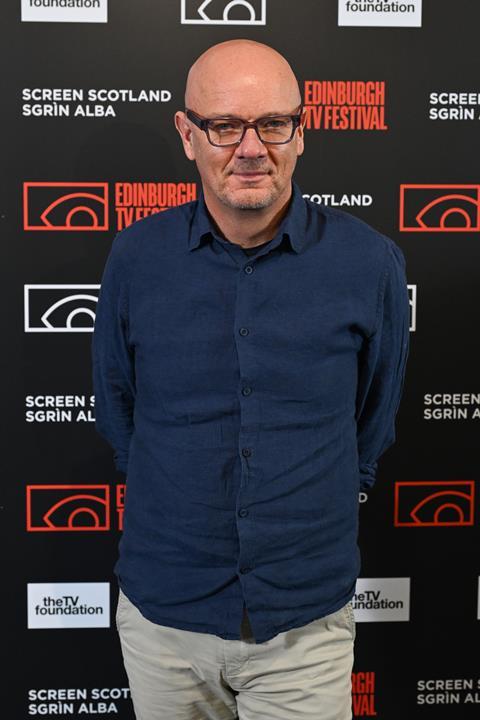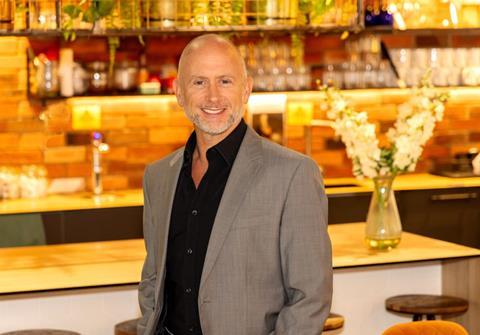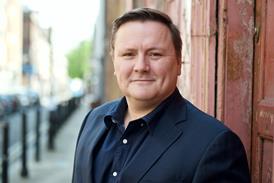Indie bosses including Zinc’s Mark Browning also discuss reform of ‘medieval’ commissioning system
Banijay UK chief Patrick Holland and Zinc Media Group chief exec Mark Browning have lambasted Channel 4’s in-house production plans and outlined how they would change the UK’s “medieval” commissioning culture.

C4 revealed details of its plan to create an in-house production business earlier this year, outlining an entity that would stand alone from the broadcaster’s commissioners.
The move has caused consternation from UK-based producers that rely on C4 commissions, and both Holland and Browning hit out at the plans here at the Edinburgh TV Festival.
“As everyone who creates IP and tries to secure return on that investment on IP will know, it is like panning for gold,” said Holland.
“The idea that they will invest in this and then have an ROI in a significant enough way to change the dial - and the balance sheet - is for the birds. It is insane, it will take a long time and it is a huge distraction when the real issues are where the audience is and how we reach them.”
Holland also reflected on his time as controller of BBC 2, when it had its own in-house production guarantees.
“I’m not saying that all shows from in-house producers are bad, that’s not true at all of course, but I would say one of the reasons that the BBC has had such creative renewal is that the in-house guarantee has ended and you don’t have to take a show just because it was from someone who was duty bound to commission.”
Browning added that the UK industry “needs and wants a healthy, growing Channel 4” but said the in-house plans could be far more detrimental than the privatisation plans of several years ago.
“I’m not bothered who owns the share certificate,” he continued, adding that spending with the indie sector was the key function of C4 and that the in-house plan would inevitably present a “threat” to that.
“If they go in-house, the in-house [orders] must come from overall shared growth, so that what they spend with indies – while maybe not being ring fenced - is from growth. I wouldn’t do in-house if I were them, it’s a complete red herring, but if they do then it needs to come from the growth of the overall channel.
“They will end up spending shedloads on this vanity exercise,” he added. Holland and Browning are not the first senior UK execs to pour cold water on the proposals, with Sony’s Wayne Garvie describing the strategy as being “ridiculous” and “potentially disastrous” in June.
Commissioning reforms and DTC
Holland, Browning and Synchronicity Films’ chief exec Claire Mundell also talked up reform of the commissioning process in the UK, as well as funding.
“The way we buy and sell is medieval,” said Browning, arguing that the roughly 400 UK indies are oversupplying the sector and needed to be reduced. He said that more consolidation would enable back-office costs to be reduced, with more money spent on creativity, resulting in better product on screen.

Holland added that the industry needs “to ask fundamental questions as to how shows get commissioned and the cost of development versus rewards”, adding that Banijay is exploring both direct-to-consumer and financing more shows itself.
“Our industry, even with the streamers, still uses a commissioning process from the 1990s,” he said, adding that Banijay is exploring putting more financing into its new shows and going direct-to-consumer with projects.
“With DTC, the problem is that our TV industry is based on a cost-plus model - you pitch an idea then the BBC or whoever will put the licence fee in, add some deficit financing and that closes the plan. What you get there is no risk.”
Holland continued that Banijay UK is replicating Banijay France’s Creators Lab scheme struck in partnership with YouTube, bringing in creators to launch ideas using both the power of the IP and the influencer or creative.
MORE FROM EDINBURGH
Ben Frow takes swipe at Ian Katz
Shonda Rhimes: I ‘struggle to understand what America is under Trump’
Ben Frow: 5 will not be sold by Paramount following takeover
BBC and Channel 4 execs play down PSB merger prospects
Lee Mason: ‘it irritates me when people call Rivals a guilty pleasure’
UKTV commissioning chief: time is right for return of comedy entertainment
“We’re also looking at how do we short circuit or cut through the traditional commissioning process, and what we’re thinking about more and more is using Banijay’s global footprint to invest significantly in creating pilots.
“Create a show and develop it, shoot the first five minutes and then build a war-chest leveraging [input] from producers in all our countries to see if we can get it away. Take the power away from the individual commissioners and do it yourself, take control.”
Mundell added that her production company Synchronicity, which is behind BBC drama Mayflies, is also investing more in-house funds in scripts and pointed to new financiers who could invest in single projects, replicating the indie film model.
Becky Gardner, head of originals at LADbible Group, added that her company has profited from lower cost development processes and a leaner piloting strategy.
“Every time we put something live, we’ll change the thumbnails or the title or do ABC testing. We know the watch times and what people are coming for, and then we can change again for the next round of shows,” she said.





























No comments yet